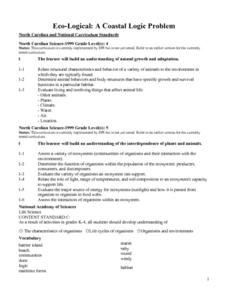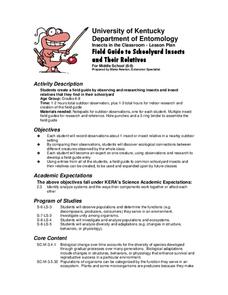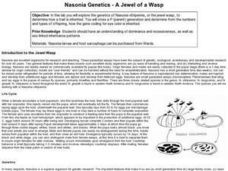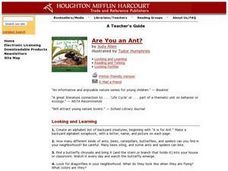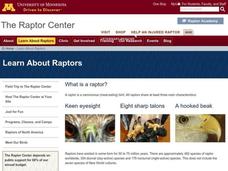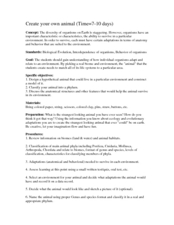Montana State University
Everest Extremes: Biodiversity
How many animals can live in a climate as cold as Mount Everest's? Find out with a science instructional activity all about biodiversity. Activities include research, presentations, group work, coloring maps, and a simulation of a food web.
Serendip
Evolution of Fur Color in Mice – Mutation, Environment and Natural Selection
Most species of animals include a variety of fur or hair color, but why? Scholars watch a video about a changing environment for mice. As the rocks around them change hues, different colors of mice begin to thrive. Discussion questions...
Curated OER
Eco-Logical: A Coastal Logic Problem
Fourth graders study the characteristics of five coastal communities. They use logic cards and matching activities to identify the proper community for plant and animal species.
Curated OER
Field Guide to Schoolyard Insects and Their Relatives
Your entire class works together to create an illustrated insect field guide. The intent is that they venture outside of the classroom, find a critter, and then research it using reference materials, insect books, and the Internet for...
Curated OER
Puffin Patrol
Bird diversity and the majestic puffin are the topics of today's lesson. Children discuss and look at images of puffins, and then they use felt to put a puffin body together. After that they talk about what and how puffins eat. They get...
Curated OER
Why Do Some Birds Have Two Homes When We Have One?
Sixth graders study migratory birds in the temperate forest and the tropical rainforest. In this migratory birds lesson, 6th graders participate in different activities that explain patterns of migration, research patterns of movement...
Curated OER
Asexual versus Sexual Reproduction
Young scholars explore reproduction. They research organisms and groups of organisms to determine whether they reproduce sexually or asexually. In addition, they determine the organism's habitat.
Curated OER
Freshwater Habitats
Students take samples from local freshwater sources and examine them for macroinvertebrate life. They take samples from both shallow and deep freshwater environments, measure temperatures, and classify organisms found in their samples.
Curated OER
Meet One Picky Bird
Students complete a research project In this endangered species lesson, students use the "Think, Puzzle, Explore" method to learn about endangered species. Students research and write a report on the red-cockaded woodpecker.
Curated OER
Water Resource Engineering
Young scholars examine solubility and the significance of water. In this aqueous solution lesson students complete a lab activity on soil profiles.
Curated OER
The Queen's Empire
Students conduct Internet research on a variety of ant species and their habitats. They have an opportunity to observe ants in their environment. Areas of interest might include ant identification, colony life, the ant life cycle, and...
Curated OER
The Dirt on Worms!
Fourth graders make predictions, observe, collect and record data. They investigate several soil and worm websites. Finally, 4th graders write a letter to The President which defends earthworms by explaining their value to the United...
Curated OER
Nasonia Genetics-A Jewel of a Wasp
High schoolers investigate the inheritance pattern of eye color in Nasonia wasps. In this genetics and inheritance lesson plan, students read about the life cycle of Nasonia wasps and hypothesize about the possibilities of eye color...
Curated OER
Are You an Ant?
Students investigate different insects in their backyard. In this insect lesson, students read the book Are You and Ant? and apply the reading to their backyards. Students create a list of animals that begin with the the letter A an make...
Curated OER
Saved by a Shark
Students explore the marine ecosystem and the importance of sharks. In this shark lesson, students look at photos of the Flower Garden Banks National Marine Sanctuary and discuss the animals that live there. They discuss which animals...
Curated OER
Global Warming
First graders discover the effects of global warming on polar bears. In this life science instructional activity, 1st graders model the polar bear's habitat and observe what happens as they raise the temperature. They record their...
Curated OER
Marine Life Protected Areas in the O.C.
Students research a Marine Protected Area and determine the species' that benefit from its protection. In this marine lesson students present their findings to the class using PowerPoint.
Curated OER
Kids Conserve? Water Preserved
Students study conservation and how cities obtain their water. In this water lesson plan students view a PowerPoint presentation and draw a picture of the water cycle.
Curated OER
How Does Evolution Work?
Learners pretend they are a scientist like John Endler in this Web activity. They visit his pools, from hypotheses, and test them out. In the process, the explore about natural selection and sexual selection. They are able to explain the...
Curated OER
Ape Cave Exploration
Students simulate online the formation of Ape Cave, in order to better explain its construction. They observe, illustrate and discuss geological features of this lava tube.
Curated OER
The Rain Forest
Pupils explain the basics of the tropical rain forest ecosystem. They list the four general layers of vegetation found in the tropical rain forest.
Curated OER
Predator-Prey Relationships
Students explore the interrelatedness of predators and prey in four different activities. They simulate an aquatic insect, fish, and osprey food chain during a poker chip game, play an M&M game to simulate the relationship between...
Curated OER
Predators Among Us
Students study environmental science. In this ecosystems lesson, students discover how humans have an impact on life in the coral reef. They watch video clips and work on small group activities. This lesson includes links to the videos...
Curated OER
Create Your Own Animal
Learners design and create their own hypothetical animal. In this biology instructional activity, students identify the factors organisms need to survive. They classify their animals according to its correct phylum.




